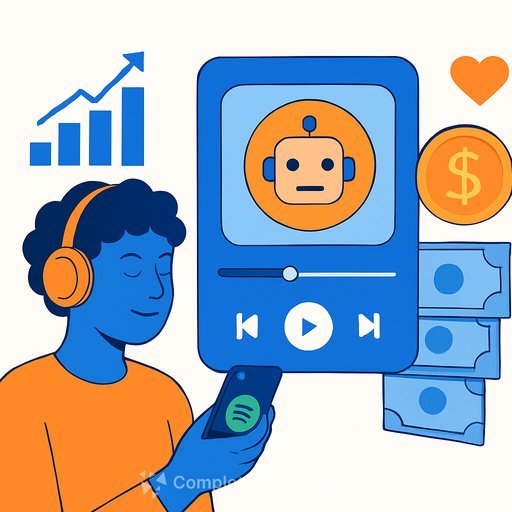Spotify's AI "Slop" Problem Is Breaking Trust in Discover Weekly
Spotify promised to fight AI impersonators and content farms. Yet paying users still report Discover Weekly playlists stuffed with low-effort AI tracks and fake artists.
The frustration is real: multiple posts on X, Bluesky, and forums describe recommendations flipping after a single AI listen, 4 out of the first 5 tracks being AI, and 6 out of 30 slots filled with junk in some weeks. The issue has lingered for more than a year, and it's pushing loyal users toward alternatives.
What users are seeing
- All-caps "artists" with generic AI profile images and empty bios.
- Dozens of releases by the same "artist" in a single year, often samey and low-effort.
- AI impersonations bleeding into New Releases meant for real artists.
- One click on a friend's AI track and recommendations start tilting AI across familiar genres.
Spotify's stance so far
Spotify announced policies to curb spam, impersonation, and deception, plus a new filter for common royalty-gaming tactics. The company says it removed more than 75 million spammy tracks in the last 12 months.
But there's no blanket ban on AI music. Spotify argues technology has always influenced music and that AI can benefit artists and discovery when used well. Many users disagree, given how the system currently promotes slop.
Policy pages for reference: Spotify Platform Rules, Stream Manipulation (Spotify for Artists).
Product lessons for PMs, engineers, and data teams
- Quality beats quantity. Flooding the catalog with cheap tracks increases noise faster than your ranking models can compensate.
- One bad recommendation costs more trust than ten good ones earn. Protect core surfaces (e.g., Discover Weekly, Release Radar) as "high-integrity zones."
- Feedback loops are fragile. A single out-of-distribution play shouldn't whiplash a user's taste profile.
- Incentives steer outcomes. If payouts and ranking reward volume over satisfaction, you'll grow slop.
Fixes Spotify (and any recommender) can ship now
- Clear labels + control: Add a visible "AI-generated" tag with an account-level toggle to hide or downrank AI music across all algorithmic playlists.
- Stronger feedback verbs: "Less like this," "Hide AI tracks," "Never recommend this artist/label," and "Report impersonation." Apply immediate downranking and global model learning.
- Taste guardrails: Weight long-term taste more than a single session; constrain how far one atypical click can move a user's embedding.
- Trust scoring: Score artists/labels on identity verification, consistent metadata, organic listening patterns, and realistic release cadence. Use trust scores to gate entry into Discover Weekly.
- Spam heuristics: Detect release floods, duplicate stems with minor tweaks, stock-cover patterns, and farm-like listening graphs. Quarantine suspicious catalogs until reviewed.
- Identity and provenance: Verified artist badges; per-track disclosures for vocals/models/tools; watermark checks where possible; public credits.
- Playlist integrity: Separate "experimental" surfaces from flagship ones. New, low-trust catalogs should earn their way into Discover Weekly.
- Model training: Include negative signals (30s skips, quick back-press, hide actions) and satisfaction proxies (saves, replays, playlist adds). Sample to avoid overfitting to spammy supply.
Metrics that keep the system honest
- Good Recommendation Rate: % of recs that get save/replay/playlist-add within 7 days.
- Complaint/Hide Rate: % of tracks hidden, reported, or marked "less like this."
- Trust-weighted catalog share: Share of listens from verified, high-trust artists within flagship playlists.
- False positive/negative in spam detection: Human-reviewed audits, weekly.
- User retention delta: Retention gaps between users who see AI-slop versus those who don't.
Listener playbook: reduce slop today
- Use "Hide," "Don't recommend this artist," and report impersonations. These actions teach the model faster than skips.
- Avoid clicking AI tracks out of curiosity on your main account. If you do, follow with "Less like this."
- Use "Exclude from your taste profile" on playlists that might confuse your recommendations (e.g., work focus mixes for kids, novelty tracks).
- Follow and save real artists you love. Positive signals help anchor your profile.
For artists and labels
- Verify identity, complete bios, and keep a sane release cadence. Trust scores matter.
- List collaborators, tools, and credits. Provenance helps platforms and fans filter out noise.
- Encourage fans to save and add tracks to playlists. Those signals push back against slop in ranking models.
The bigger picture
Generative tools have widened the top of the funnel. Without strong integrity systems, that volume overwhelms discovery and punishes loyal listeners. Clear labels, opt-outs, better feedback loops, and trust-weighted ranking would restore confidence fast.
If your team is building recommenders or AI features and needs to upskill on safety, evaluation, and product integrations, explore practical training paths here: AI courses by job role and courses by leading AI companies.
Your membership also unlocks:










